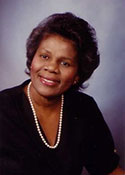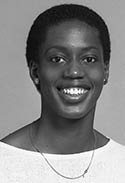African-American Women at the Forefront (1981-2002, Section 6)
Female physicians of all races have struggled for more than 150 years to earn their place in the field of medicine. In 1849, Elizabeth Blackwell became the first woman to graduate from medical school at the Geneva Medical College in New York.
Within ten years of opening their doors in 1868 and 1876, respectively, both Howard University School of Medicine and Meharry Medical College admitted women into their programs. Gender discrimination persisted, however, and the number of women admitted remained disproportionately low well into the 1960s. A common argument used to justify limiting the number of female medical students was the mistaken idea that medically trained women would abandon medicine when they began their families.
Aware of this prejudice, Dr. Eula Faye Perry has dedicated part of her career to educating young women doctors on how to balance the demands of career and family. A physician in Houston since the early 1960s, Dr. Perry and her husband, Dr. Levi Perry, had ten children, seven of whom became physicians.
Since the 1960s, the number of women studying and practicing medicine increased substantially, but still does not constitute a majority of the profession. Female African-American physicians often faced the double burden of gender and racial discrimination. Nonetheless, many of Houston’s women doctors have assumed leadership roles in medicine, in their communities, and on the national stage.
In 1980 Dr. Judith Craven, an anesthesiologist who had graduated from Baylor College of Medicine six years earlier, became the first woman and second African-American to hold the position of Director of Health Care Services for the City of Houston Health Department (HHD). HHD promotes health and social well-being through advocacy, education and community-based health services. Her achievements garnered a number of awards. In 1991, Dr. Craven was elected Dean and Vice President of Minority Affairs of the University of Texas Health Science Center at Houston School of Allied Health Science. In 2001, she became the first African-American woman to serve on the board of University of Texas System.
Howard University Medical School alumna Dr. Joye Carter is board certified in forensic, anatomical, and clinical pathology. Following service in the U.S. Air Force, Dr. Carter became the chief medical examiner for the District of Columbia. In doing so, she became the first black female chief medical examiner in the history of the United States. In 1996, she moved to Houston and became chief medical examiner for Harris County, the first female and first African-American to lead a medical examiner’s office in Texas. She held that position until October 2002. Dr. Carter has written two books about her experiences as a medical examiner, My Strength Comes from Within (2001) and I Speak for the Dead (2003).
Dr. Mae F. McMillan became a board member of the Mental Health and Mental Retardation Authority of Harris County (MHMRA) in 1998. She is also vice chair of MHMRA, chair of their Program Committee, and Board liaison to the Medical Planning Advisory Council. Dr. McMillan completed her child psychiatry training Baylor College of Medicine medical school in 1966. In addition to Baylor, she served on the faculty of the University of Texas and Texas Women’s University. She was also the only African-American child psychiatrist to receive training in Hempstead Clinic located in London.
Like Bernard Harris, Dr. Mae C. Jemison, a native Chicagoan, soared to new heights as an astronaut on the space shuttle Endeavor in September 1992. Indeed, the first African-American woman in space, she preceded him by a few years. Dr. Jemison received her medical degree from Cornell University in 1981.
After leaving NASA in 1993 she founded the Houston-based Jemison Group, Inc., which researches and develops technologies related to the social, political, cultural and economic context of the individuals, especially for the developing world. The National Women's Hall of Fame inducted Dr. Jemison in 1993.




